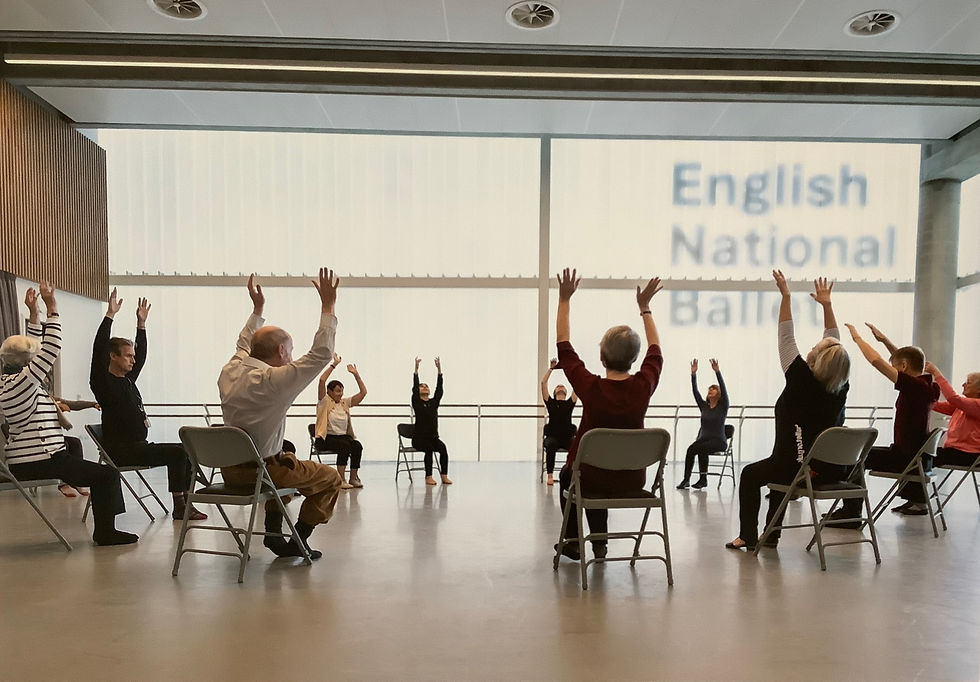Special 2 day Chronic Pain: please sign up now!
- Awa
- Mar 5, 2022
- 3 min read

I wanted to share my news with you, this week I was so honoured to be invited at the English National Ballet and explore their programme they offer on “Dance for Parkinson’s and Dementia”. What a treat!
I‘m also taking the time to thank our 8 wonderful participants who joined the Sound & Movement Therapy group yesterday. The written and verbal feedbacks were very constructive and your shared experience empowering, thank you!
According to Oxford University Hospital, “Chronic (long term) pain is a debilitating condition in which overwhelming pain signals affect everyday function and quality of life. It may have an underlying cause such as trauma, wear and tear, infection, inflammation or abnormal cell growth. However, by far the majority of young people with long term pain do not have such an underlying condition. They have a pain syndrome in which the pain pathway itself is at fault.
Chronic pain alone affects 8% of young people aged 13 to 18 years and 10% of adults. Younger children can also be affected. There is often an identifiable onset to the pain. Persistence of the pain is complex and due to a combination of factors.
Many young people find their own way to manage chronic pain until it disappears. Others benefit from the support of their GP, local physiotherapist and alternative therapies (such as osteopathy and herbalism). However some young people have pain that continues despite these strategies to disrupt schooling, family life and social contact and require support from specialist services.”
According to NHS Scotland, 1 in 5 people suffer from Chronic Pain, it is a persistent pain that carries over 12 weeks. “Chronic pain can also affect people living with:
diabetes
arthritis
fibromyalgia
irritable bowel
back pain”
In the “Ways to manage Chronic Pain” page, the NHS explains that “Lying in bed for long periods can make back pain last longer. Lack of activity can make:
you stiffen up
your muscles and bones weaker
you sleep less well
you become lonely and depressed
pain feel worse
You may also find it becomes harder to get going again.
A better approach to reducing pain is a combination of:
exercise
staying at work
physical therapy
painkillers”
The NHS adds that ''Activity and stretching needs to become part of your lifestyle so you routinely do exercise a little and often.Try to be active every day instead of only on the good days when you're not in so much pain. This may reduce the number of bad days you have and help you feel more in control.”
“Physical therapy: Pain experts often recommend a short course of physical therapy.
This helps you to move better, relieves your pain, and makes daily tasks and activities easier, like walking, going up stairs or getting in and out of bed. Physical therapy for persistent pain can involve manipulation, stretching exercises and pain-relief exercises. Physical therapy is usually delivered by a physiotherapist, chiropractor or osteopath, or in some cases, an occupational therapist. Physiotherapists can give you advice on the right type of exercise and activity. Occupational therapists can support you with environmental changes that can help you remain in work and function better at home. If you have physical therapy, you should begin to feel the benefits after a few sessions. Your GP may be able to refer you for physical therapy on the NHS, although physical therapy is only available privately in some areas. “
And how lucky you are, that we start a 2 day workshop on Chronic Pain this Sunday and next Sunday. We need more people to book so that we can present your experience of Chronic Pain and Movement to the NHS.
Please book as many sessions as you can. If you can, please promote the Chronic Pain workshop for me that would be much appreciated. As you can imagine, promoting and advertising take most of my time, and as you can imagine I would prefer developing my session plan so you get an even deeper experience. So, please if you can share the workshops to your friends and family on your whatsapp groups and social media and invite them to our Friday 6:30pm workshops and/ or Sunday 6pm workshop that would be amazing!!

Thanks for supporting this healing sound and therapeutic movement research project,
Awa
Movement Facilitator
Founder of The Ojas Centre
FB/ IG: @theojascentre
https://www.theojascentre.com/book-online



Comments